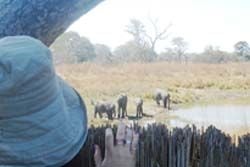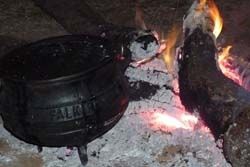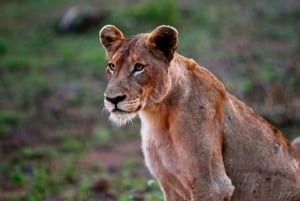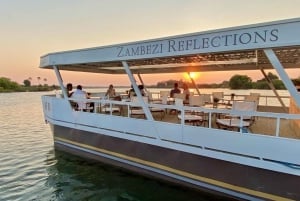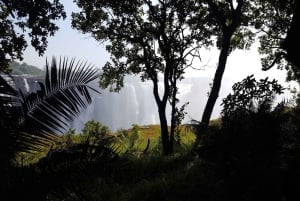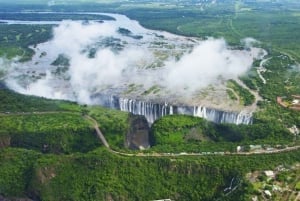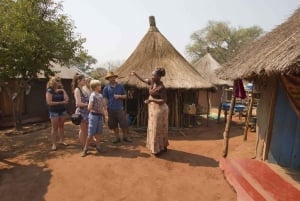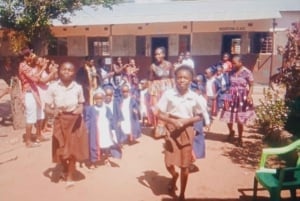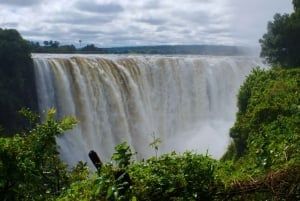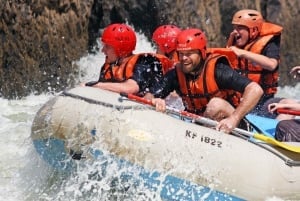Kafue National Park
Kafue National Park is the oldest park in Zambia. It was established by Norman Carr in the 1950’s. At 22 400Km2 (about the size of Wales) this is the largest of Zambia’s parks and one of the largest national parks in Africa and indeed, the world.
A number of camps and lodges operate in and around the park and thanks to these lodge operators, and the Zambia Wildlife Authority ZAWA, recent years have seen a dramatic decrease in poaching and corresponding increase in game numbers.
Fed by three beautiful rivers, the Lunga, Lufupa and the Kafue River, the park is home to large herds of animals and a huge diversity of wildlife, 55 large mammal species – including 20 antelope and 6 cats – and 491 bird species, including the endemic Chaplin’s Barbet as well as wattled crane, purple crested loerie and Pel’s fishing owl.
The primary predators are leopard, cheetah and large prides of lion but a busy host of smaller carnivores are equally present, including side-striped jackal, civet, genet and mongoose. Wild dog numbers are hopefully on the rise and are being seen more regularly.
The Northern section of the park is the home of Basunga Plains. As in the Serengeti, the annual floods bring with them huge heards of grazing animals closely followed by many different predators alert and ready for an easy meal.
In the south of the park there are the Nanzhila Plains a beautiful grassland area scattered with tree-crowned termite mounds. This area provices the best opportunity to view the black-cheeked lovebird, an endangered species near endemic to Zambia.
Lake Itezhi Tezhi, also in the south of the park, is a favoured spot for hippos and the drowned trees along its shoreline provide roosting and breeding sites for water birds such as cormorants and the African fish eagle.
The Kafue and Lunga Rivers and Lake Itezhi Tezhi offer wonderful fishing opportunities, especially bream, barbel and fresh water pike.
KNP is also the home of Camp Phoenix, the Kafue release facility for orphan elephants considered old enough to move from the Lilayi Elephant Nursery.
Getting There
- The easiest and most comfortable way to get to the park is a scheduled charter flight to Kafue usually from Livingstone or Lusaka.
- East/West. The M9 Lusaka-Mongu road dissects the park.
- Northern Camps such as Hippo Camp, McBride’s or Lunga Cabins, take the road to Mumbwa take the left turn at the roundabout by the filling station.
- To reach the Southern section of the park, continue past the turn off for Mumbwa, stay on the main M9 road, heading west. 66kms from Mumbwa you go through the Nalusanga Gate to the park, after this gate, approximately 20km, turn left, the road is well signposted for Itezhitezhi town and the dam. Following the Itezhi-tezhi D769 road allows for access to Puku Pan, Kaingu Camp and the various lodges on the lake itself. This road is gravel but does require a good strong vehicle, as it is long and bumpy.
- To reach the Busanga plains and nearby camps, take the road that goes through the park until you reach the Kafue River Bridge. Shortly after the bridge is a gate on the northern side which leads to Kafwala and Lufupa camps. Driving from the Hook Bridge Gate will take you approximately 5 to 6 hours, this is a bush road and only accessible when dry.
- From the north, coming from the Copperbelt, take the road to Solwezi and then to Kasempa. Here a reasonable graded track for 98 kilometres will take you to the Lunga Pontoon. To reach the northern Kafue gate, take the left turning 16 kilometres before the pontoon.
- From Livingstone travel to Kalomo on the T1 to Lusaka. In Kalomo turn left through the open air market follow the D714 graded road for 74kms to the southern Dundumwezi Entrance Gate. This gate leads to Nanzhila Plains Camp, Ngoma and Lake Itezhi-tezhi further north.
- Note that a 4×4 is recommended for most of these routes and be aware of seasonal road closures. You will be driving through areas where wildlife has right of way so travel carefully, equipped and with as much knowledge as possible. Most camps will arrange road travel for you.


